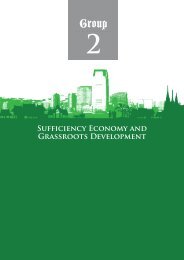Conflict, Legitimacy and Government Reform: Equitable Allocation of ...
Conflict, Legitimacy and Government Reform: Equitable Allocation of ...
Conflict, Legitimacy and Government Reform: Equitable Allocation of ...
You also want an ePaper? Increase the reach of your titles
YUMPU automatically turns print PDFs into web optimized ePapers that Google loves.
Panel Discussion<br />
this vision that all education had civic purposes <strong>and</strong> that every teacher<br />
was a civics teacher. Evidence <strong>of</strong> the centrality <strong>of</strong> that vision to our<br />
school system is the fact that 40 <strong>of</strong> our 50 state constitutions underline<br />
the importance <strong>of</strong> civic literacy; 13 state constitutions identify the<br />
central purpose <strong>of</strong> their educational system as promoting good<br />
citizenship, democracy, <strong>and</strong> free government. 1<br />
The origin <strong>of</strong> the U.S. public school system in the search for civic<br />
literacy <strong>and</strong> virtue contrasts with the diverse missions our school systems<br />
identify as central today. Those missions include preparing students to be<br />
good economic units in an industrial production process; making<br />
students “happy” <strong>and</strong> “well-rounded;” preparing them to compete<br />
with other nations in science <strong>and</strong> math to ensure our technological <strong>and</strong><br />
military superiority; <strong>and</strong> many others. Instead <strong>of</strong> occupying a central role<br />
in schools, civic education is relegated to the fringes <strong>of</strong> the educational<br />
curriculum, if it is included at all.<br />
On May 16, 2007, the latest National Assessment <strong>of</strong> Educational<br />
Progress (NAEP) Civics Report Card was issued. In the words <strong>of</strong> the<br />
Center for Civic Education’s Executive Director, Charles N. Quigley, the<br />
NAEP study.<br />
…is a confirmation <strong>of</strong> the neglect that many pr<strong>of</strong>essionals in the<br />
field <strong>of</strong> civic education have known about for many years: that the vast<br />
majority <strong>of</strong> our young people are either not taught civics <strong>and</strong> government<br />
at all, or they are taught too little, too late, <strong>and</strong> inadequately. The results<br />
confirm the fact that the past several decades <strong>of</strong> educational policy <strong>and</strong><br />
practice have focused more <strong>and</strong> more on developing the worker at the<br />
expense <strong>of</strong> the citizen. These findings are grounds for concern, <strong>and</strong> they<br />
call for a national response to remedy a serious deficiency in the<br />
education <strong>of</strong> American citizens. 2<br />
1 The Civic Mission <strong>of</strong> the Schools, Carnegie Corporation <strong>of</strong> New York <strong>and</strong> CIRCLE,<br />
The Center for Information <strong>and</strong> Research on Civic Learning <strong>and</strong> Education, 2003.<br />
2 Charles N. Quigley, Executive Director, Center for Civic Education, “Response to<br />
the May 16, 2007, Release <strong>of</strong> the 2006 National Assessment <strong>of</strong> Educational Progress<br />
Civics Report Card” Center for Civic Education, May 16, 2007<br />
79














